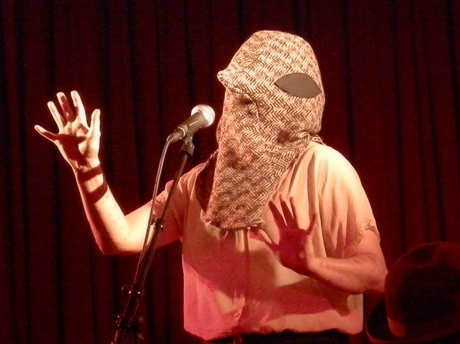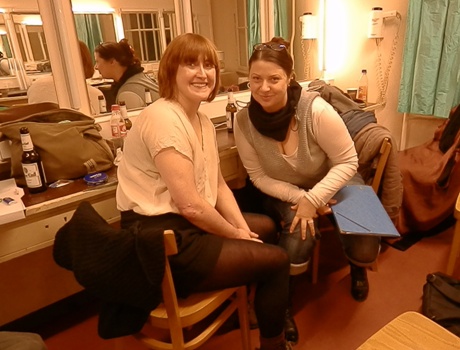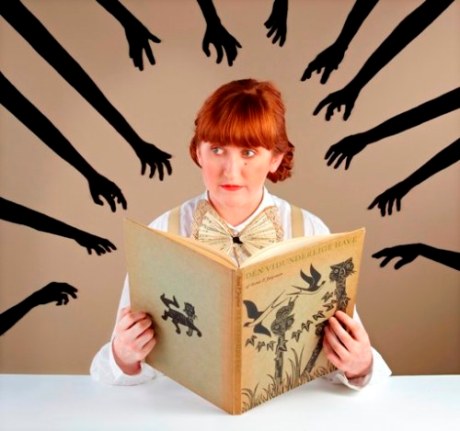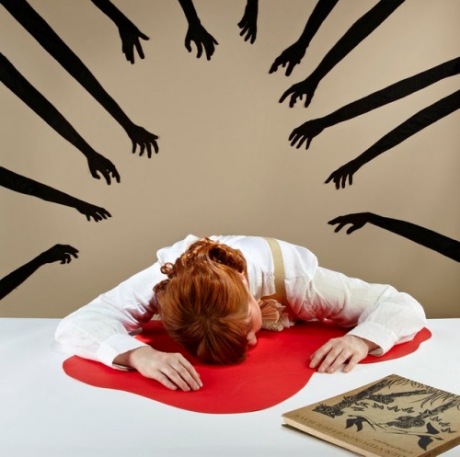Henker, Lumpenhändler und eine Lady, die den Blues singt: Liz Green im Klangverführer-Interview
Eigentlich sollte dieses Interview samt Konzert schon im Dezember stattfinden. Dann aber zog sich die Künstlerin eine unangenehme Ohrenentzündung zu und der Berliner Promotermin wurde verschoben. Beim nächsten Versuch gestaltete sich das Ganze noch komplizierter, da die Interviewanfrage zwar relativ kurzfristig kam, mit dem genauen Termin aber erst am Vorabend des Ereignisses herausrückte. Das ganze Hin udn Her hat mir aber endlich die Frage beantwortet, die mich schon lange umtreibt: Weshalb es kaum weibliche Musikkritiker gibt: Weil sich Spontanaktionen meist nicht mit der im Vorfeld minuziös abzustimmenden Planung von Kinderbetreuung verbinden lassen. Wer da keine engelsgeduldigen Großeltern oder eine trotz eigener kleiner Familie unendlich flexible Kopfhörerhundetagesmutter hat, kann solche Interviews schlicht nicht führen. Und, ganz ehrlich: Würde ich nicht glauben, dass Liz Green mit
O, Devotion! jetzt schon die Platte des Jahres abgeliefert hätte, die von nichts, was da in 2012 noch kommen mag, getoppt werden kann, dann wäre auch ich ob des ganzen Planungsunsicherheitsdurcheinanders nicht hier. Aber Greens Platte ist nun einmal schlicht umwerfend, und ich bin gespannt auf die Frau, deren Familie auf eine lange Ahnenreihe von Henkern und Lumpenhändlern zurückblickt, wodurch sich, möchte man der Legende Glauben schenken, ihr Hang zum Makaber-Abseitigen erklären könnte.
Die Neo Folk/Blues-Sängerin traf ich unmittelbar vor ihrem Auftritt im Roten Salon am Sonnabend in Berlin.
Your current album is called “O, Devotion!”. So of course I first would like to know, what does devotion mean to you?
Oh well … Some people think that it’s religious devotion, but it’s not. Forget that. Devotion is just a word and it means the kind of dedication and love of something … for me. You know, if you devote yourself to something sometimes it can be frustrating. You can get angry. That’s that.
A lot of people would say that „O, Devotion!“ is Singer/Songwriter or Indie Pop, but I personally sense that it is rather a Blues album. How would you describe your style of music?
Well, if it is genre, it’s probably more Blues than anything else. That’s what I was listening to when I started to write music, so that’s the obvious first influence. But I would say that I would always consider myself Pop. Because I want to reach as many people as possible. I want them to hear it, regardless whether they’re into Indie music or Dance music or whatever music they are into. You know, my brother is a really big Drum&Bass fan. And when he heard my music he was like, oh, this sounds really good, it’s really cool. And I was just like, oh, but you like Drum&Bass! And he said, yeah, but this is kinda good! So I call it Pop, because Pop is the one genre that lets other genres kind of fall in together.
I believe two or three of the songs of your album were already recorded some years ago, for example „Midnight Blues“ or „Bad Medicine“, but it’s only now that the album appeared. What took you so long to finish it?
I don’t know. I’ve been telling people that I went to Mexico to find Alpacas and make jumpers. Mainly because I don’t want to answer the question. I don’t know how it happened … You know, the idea was ensuring … It was that kind of everything started happing before I thought it could be a possibility. It was always that my life decided that I was gonna be a musician before I even thought of it. I mean, I do want to be a musician. But it took a little bit of time to write some more songs and kind of let the song become what I want it to be.
Well, I think read in one of your previous interviews that you said it was also such a difference between playing live and then go to the studio with its sterile atmosphere and all the microphones pointing at you …
Yeah, I think when I recorded the first time it was always unexpected. I’ve never done it before. And it was my friend who had a tiny little record label – he then became my manager, a nice progression – and he said, hey, come to my house, we’ll record a song. And I think I was a bit drunken, so I was like, hey, yeah, let’s record a song, and so it was done. When I first heard it I was like, uah, it’s horrible! But he thought it was brilliant. For me, it just didn’t sound like it sounded in my head. And this album … it took me a while to work out what I have to do to make it sound like that. Plus, I thought that I was gonna make an album, and if I only was to make one album I wanted to make something that had a little of … well, a kind of that someone will be able to pick it up in a hundred years from now, listen to it and think that, oh, this still sounds good! You know, that’s what I’ve been listening to lately, to some songs which were made in 1912, and now it’s 2012 and they still sound good.
The brass section plays a major role on your album which seems kind of unusual for non-Dixieland, non-Balkan recordings. Why did you opt for the brass sound?
Well, I played music in Manchester, and if you play music in Manchester you get to meet everybody who plays music there. So the double bass player and the saxophone player on the album – we’re just friends. We started jamming together, and when I was about to go off to the tour in Europe I asked them to come with me …
So you are trying to say that the instrumentation on your album happened by chance? If your friend had been a piano player it would have been different?
Yes, might be. So they will be here tonight, the double bass, the saxophone and the trombone …
… and you will play the mouth trumpet? I heard you are a very talented mouth trumpet player …
Yes, because my trumpet player moved to Malaysia! Like, I didn’t know where he was because I haven’t been dealing with him for a couple of weeks. Two weeks ago, I had dinner with him, and two weeks later I was like, Perry, the album is coming out and I need you on the tour. And he was like, Liz, I moved to Malaysia. And I was, okayyyy … how long is that for? and then he said, I live there. So I had got to learn mouth trumpet!
Well, apart from the uncommon instrumentation it’s first and foremost your voice that catches the listener immediately and awakes long-forgotten layers of the musical memory of humanity … How come you sound like from another time?
Well, I don’t know. It is just what came out. That is what I sing like. I mean I think female singers have become quite … (sings in a breathing voice) ohh-ahhh …. Which is fine cuz some of it is brilliant, but I’m not like that! I’m a bit of … (shouts out loud) …ahhhh! And a lot of people whom I really admire, people like Judy Garland or Billie Holiday or Ella Fitzgerald, they soud like that, too.
Critics compare you to each of them …
Yeah, it’s weird, but I think it could be much much worse!
And I think they are perfectly right! When I heard the first beats of „Hey Joe“ it was really like listening to a long-forgotten Billie Holiday recording. I mean, the sound was more modern, of course, there were no scratches or whatever in it, but still …
Wow, what a great compliment!
So you say it is just the way you sound by nature …
Yeah, because I don’t use a special vocal technique or something … I mean, I was in the school choir when I was eleven, but that’s that. I didn’t really sing much. I used to sing in the house when nobody was in – and you can’t hear yourself. So I do remember all the records I sang along to, above all Ella Fitzgerald records, maybe it’s natural that this brought me this kind of inflections – but that’s the music that I like! So that’s just how my voice comes out and I find … me and my friend George in Britain … when the music really hits us it can be any kind of music sung by anyone, but when it really hits you it hits you right there (points to her heart). And that’s the music I enjoy. I think you probably have to sing from there in order to convey that power.
One of the songs of your album is called “Rag and Bone”. The press release states that you descend from a family that includes executioners as well as rag and bone men. Is this true – and if so, could this be a possible explanation for your fascination with macabre stories?
Well, it’s storytelling really – and rag and bone men are actually really common in Britain. It’s just that the name sounds quite macabre. Actually, a rag and bone man is just like not a shop man. In the old days, they used to ride in horsing cars along the streets. And in Liverpool this is what we found out when doing a family tree. So my ancestors used to ride in horsing cars along the streets in Liverpool and yell out, “Any old iron? Any old clothes?”, and they would put this stuff in the waggon and sell it to other people. So that’s a rag and bone man, quite a normal, honorable profession. Executioners … (laughs)
Oh, I was just asking it because the press release opens with it.
Yeah, I know. I mean, it could be a story …
Apart from the myth around your person, there’s a bunch of strange figures who populate the spiritual cosmos of your album, for example half-man-half-bird Joe and his wife Oko, there’s shadow play, there are masks … Where do these figures and things come from?
My imagination! I think imagination is sometimes much more reliant than music for the moment. Because a lot of music seems to be quite confessional, you know … (sings) … “I did this and then he did that, and then I loved him but now he doesn’t love me, oh oh, the pain” … Which is fine. Because I do like music that is like that, but I can’t tell that kind of story. It’s difficult. So I have to build up stories that have characters to be able to express the different thoughts of human experience or emotion.

The Ballad of Joe and Oko: Liz Green plays the part of half-man-half-bird Joe, Berlin, January 28, 2012
Direkt nach dem Interview ging es auch schon mit Supporterin Hannah Miller los, die, wenn sie nicht zwischen Cello und Gitarre mäandernd für Liz Green die Show eröffnet, Sängerin bei den Moulettes ist, denen der Ruf als „uncategorisable quintet“ vorauseilt. Und auch Miller solo ist im positiven Sinne Genre-sprengend; da wird das Cello schon mal zum gezupften Jazz-Bass – googlen Sie mal „Hannah Miller sings the Blues“, denn das kann diese Lady aus Brighton mindestens ebenso gut wie der Main Act des Abends. Eine klare Trennung zwischen Vor- und Hauptprogramm gibt es hier ohnehin nicht, da spielt der Green’sche Saxophonist schon mal ein Duett mit Miller, die ihrerseits bei dem Set von Liz Green das eine oder andere Stück am Cello begleitet. Man ist eben befreundet und unter sich. „Verdammte Hippies“, versucht sich Bassplayerman an der Parodie reaktionären Kommentatorenguts angesichts der flatterärmeligen, Schal tragenden und auf halb-kaputten Instrumenten spielenden Musiker. Ob Hippie oder nicht – ein lustiger Haufen sind die durch viele Zwischenrufe beim Set des jeweils anderen auffallenden Brightoner allemal; und das Wort „offen“ würde dem feucht-fröhlichen Umgang der Clique mit Hochprozentigem nur schwer gerecht. Der Rum jedenfalls könnte eine Erklärung für die live dann doch ziemlich schwiemeligen Bläser-Arrangements sein, die sich auf der Platte so wohltuend im Hintergrund halten. Aber sehen Sie selbst:



